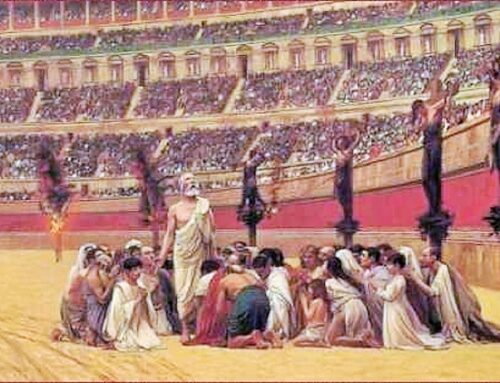1.“Part of the same world”
The first Christians were considered part of the same world: “what the soul is to the body, Christians are to the world.”(Epistle to Diognetus, II-III c.)
They were not different from the other men of their time: they wore the same clothes, had the same customs, and were equally citizens of their respective localities.
The early Christians occupied a place in the social structure of their time. If one was enslaved, one did not lose his being Christian; in fact, his life acquired a supernatural dimension. This Christian attitude assimilates positive values, even those that existed in paganism. Thus St. Justin comments on pagan thinkers: “Whatever, then, of good is this in all of them, belongs to us Christians”. (Encyclopedia GER, Primeros Cristianos II, Espiritualidad)
2.“The life that they practice is not of an extraordinary kind”
“For Christians are not distinguished from the rest of mankind either in locality or in speech or in customs. For they dwell not somewhere in cities of their own, neither do they use some different language, nor practice an extraordinary kind of life. Nor again do they possess any invention discovered by any intelligence or study of ingenious men, nor are they masters of any human dogma as some are. But while they dwell in cities of Greeks and barbarians as the lot of each is cast, and follow the native customs in dress and food and the other arrangements of life, yet the constitution of their own citizenship, which they set forth, is marvellous, and confessedly contradicts expectation.” (Epistle to Diognetus, II-III c.)
3. They obey the laws
Saint Peter
“Wherefore I will rather honor the king [than your gods], not, indeed, worshipping him, but praying for him. But God, the living and true God, I worship, knowing that the king is made by Him. You will say, then, to me, “Why do you not worship the king?” Because he is not made to be worshipped, but to be reverenced with lawful honour, for he is not a god, but a man appointed by God, not to be worshipped, but to judge justly. For in a kind of way his government is committed to him by God: as He will not have those called kings whom He has appointed under Himself; for “king” is his title, and it is not lawful for another to use it; so neither is it lawful for any to be worshipped but God only. Wherefore, O man, you are wholly in error. Accordingly, honour the king, be subject to him, and pray for him with loyal mind; for if you do this, you do the will of God. For the law that is of God, says, ‘My son, fear thou the Lord and the king, and be not disobedient to them; for suddenly they shall take vengeance on their enemies.’” (St.Theophilus, Book to Autolycus, II c.)
4. They live in honesty.
“But we are called to account as harm-doers on another ground, and are accused of being useless in the affairs of life. How in all the world can that be the case with people who are living among you, eating the same food, wearing the same attire, having the same habits, under the same necessities of existence?
We do not forget the debt of gratitude we owe to God, our Lord and Creator; we reject no creature of His hands, though certainly we exercise restraint upon ourselves, lest of any gift of His we make an immoderate or sinful use. So we sojourn with you in the world, abjuring neither forum, nor shambles, nor bath, nor booth, nor workshop, nor inn, nor weekly market, nor any other places of commerce.
We sail with you, and fight with you, and till the ground with you; and in like manner we unite with you in your traffickings—even in the various arts we make public property of our works for your benefit. How it is we seem useless in your ordinary business, living with you and by you as we do, I am not able to understand
I will confess, however, without hesitation, that there are some who in a sense may complain of Christians that they are a sterile race: as, for instance, pimps, and panders, and bath-suppliers; assassins, and poisoners, and sorcerers; soothsayers, too, diviners, and astrologers. But it is a noble fruit of Christians, that they have no fruits for such as these. And yet, whatever loss your interests suffer from the religion we profess, the protection you have from us makes amply up for it.
It is always with your folk the prison is steaming, the mines are sighing, the wild beasts are fed: it is from you the exhibitors of gladiatorial shows always get their herds of criminals to feed up for the occasion. You find no Christian there, except simply as being such; or if one is there as something else, a Christian he is no longer. We have learned from God to live in honesty.” (Tertullian, The Apology, II-III c.)



Leave A Comment
You must be logged in to post a comment.